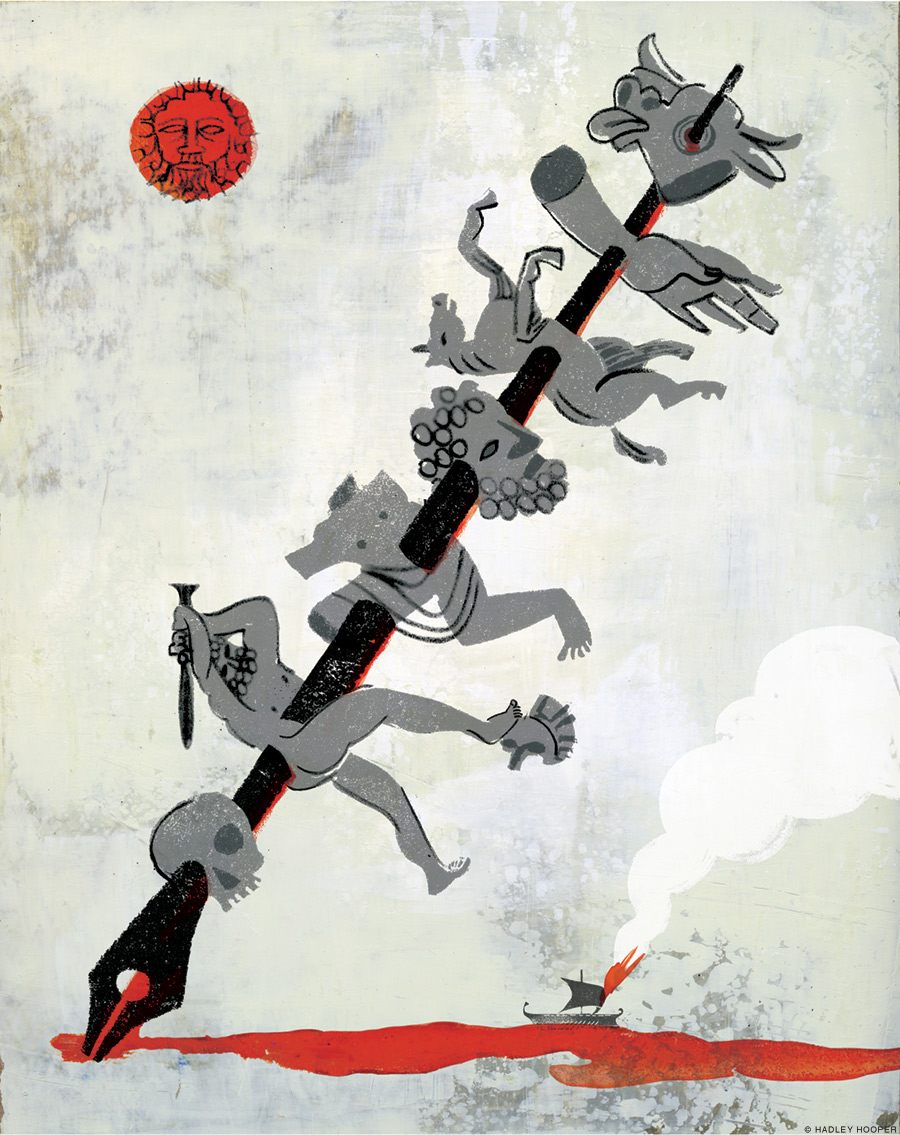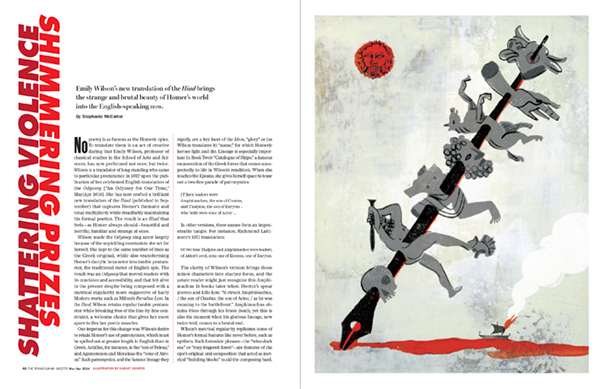
Emily Wilson’s new translation of the Iliad brings the strange and brutal beauty of Homer’s world into the English-speaking now.
By Stephanie McCarter | Illustration by Hadley Hooper

No poetry is as famous as the Homeric epics. To translate them is an act of creative daring that Emily Wilson, professor of classical studies in the School of Arts and Sciences, has now performed not once, but twice. Wilson is a translator of long standing who came to particular prominence in 2017 upon the publication of her celebrated English translation of the Odyssey [“An Odyssey for Our Time,” Mar|Apr 2018]. She has now crafted a brilliant new translation of the Iliad (published in September) that captures Homer’s thematic and tonal multiplicity while steadfastly maintaining his formal poetics. The result is an Iliad that feels—as Homer always should—beautiful and horrific, familiar and strange at once.
Wilson made the Odyssey sing anew largely because of the unyielding constraints she set for herself. She kept to the same number of lines as the Greek original, while also transforming Homer’s dactylic hexameter into iambic pentameter, the traditional meter of English epic. The result was an Odyssey that moved readers with its concision and accessibility, and that felt alive in the present despite being composed with a metrical regularity more suggestive of Early Modern works such as Milton’s Paradise Lost. In the Iliad, Wilson retains regular iambic pentameter while breaking free of the line-by-line constraint, a welcome choice that gives her more space to flex her poetic muscles.
One impetus for this change was Wilson’s desire to retain Homer’s use of patronymics, which must be spelled out at greater length in English than in Greek. Achilles, for instance, is the “son of Peleus,” and Agamemnon and Menelaus the “sons of Atreus.” Such patronymics, and the famous lineage they signify, are a key facet of the kleos, “glory” or (as Wilson translates it) “name,” for which Homeric heroes fight and die. Lineage is especially important in Book Two’s “Catalogue of Ships,” a famous enumeration of the Greek forces that comes unexpectedly to life in Wilson’s rendition. When she reaches the Epeans, she gives herself space to tease out a two-line parade of patronymics:
[T]heir leaders were
Amphimachus, the son of Cteatus,
and Thalpius, the son of Eurytus –
who both were sons of Actor …
In other versions, these names form an impenetrable tangle. For instance, Richmond Lattimore’s 1951 translation:
Of two tens Thalpios and Amphimachos were leaders,
of Aktor’s seed, sons one of Kteatos, one of Eurytos.
The clarity of Wilson’s version brings these minor characters into sharper focus, and the astute reader might just recognize this Amphimachus 11 books later when Hector’s spear pierces and kills him: “it struck Amphimachus, / the son of Cteatus, the son of Actor, / as he was running to the battlefront.” Amphimachus obtains kleos through his brave death, yet this is also the moment when his glorious lineage, now twice told, comes to a brutal end.
Wilson’s metrical regularity replicates some of Homer’s formal features like never before, such as epithets. Such formulaic phrases—the “wine-dark sea” or “rosy-fingered dawn”—are features of the epic’s original oral composition that acted as metrical “building blocks” to aid the composing bard. These often, but not always, appear at the same place in the poetic line. An example of this in Greek is podarkēs dios Akhilleus, a phrase that Wilson puts to the same metrical use as Homer, often employing it to occupy the first three-and-a-half feet:
swift-footed Lord Achilles stood and spoke
swift-footed Lord Achilles said to him
swift-footed Lord Achilles scowled and said
We also see the metricality of epithets in phrases such as “master strategist” to describe Odysseus, or “master of the war cry” to describe Menelaus or Diomedes. This fundamental Homeric feature is lost in translations that pay less rigorous attention to meter.
The great success of Wilson’s highly readable epic style is that she can achieve elevated poetry without making it excessively flowery, archaic, or overworked. Her clear expression lets her poetic devices shine through to great effect. We get a sensory experience of Homeric battle when, for instance, Diomedes hurls his spear at Hector in Book Eleven:
The spear struck Hector’s head,
the top part of his helmet. But it failed
to reach his handsome skin. Bronze beat back bronze –
the triple-layered helmet with its visor,
given to Hector by Apollo, saved him.
Wilson’s poetic skill here combines with Homer’s. The “h” and “b” alliteration picks up alliteration present in the Greek (plankhthē d’ apo khalkophi khalkos). Yet the spondees (bronze beat back bronze) that slow the spear’s strike are of Wilson’s own clever devising.
Wilson’s best poetry, like Homer’s, comes at some of the most gruesome moments, when the body breaks under violence, as in the death of the minor character Erymas:
Then Idomeneus
struck Erymas across the mouth. The spear
of pitiless bronze drove right up through his brain
and shattered his white skull, shook out his teeth,
and filled both eyes with blood. His mouth gaped wide
and spurted blood. Blood gushed out of his nostrils.
Then death’s black cloud wrapped round and covered him.
Compare Robert Fagles’ 1990 translation:
Idomeneus skewered Erymas straight through the mouth,
the merciless brazen spearpoint raking through,
up under the brain to split his glistening skull –
teeth shattered out, both eyes brimmed to the lids
with a gush of blood and both nostrils spurting,
mouth gaping, blowing convulsive sprays of blood
and death’s dark cloud closed down around his corpse.
Poetic taste is subjective, but to me so much of the scene’s power gets lost in Fagles’ ornate language—“glistening” for the straightforward leuka (“white”), “convulsive sprays” for prēse, (“gushed”)—or in his additions, such as “corpse,” which has no parallel in the Greek. Whereas Fagles leans on verbal exuberance to achieve pathos, Wilson’s translation is pared down, instead exploiting rhetorical devices such as alliteration (shattered … shook; cloud … covered; wrapped round), enjambment (and spurted blood), and repetition (blood … blood … blood), all of which have parallels in the Greek. In Fagles, violence comes across as somehow larger than life, whereas in Wilson war’s beauty is tied, more disturbingly, and intrinsically, to its unprettified horror.
Wilson also gets the tone right when translating the scenes of divine comedy that throw the unfolding human tragedy into relief. The Iliad is generally not a poem that makes me laugh, but I had to guffaw when, in Book Fourteen, Zeus delivers a catalogue of his sexual escapades to his wife Hera as she seduces him. Here again Wilson uses meter to great effect, capturing the metrical refrain oud’ hote (“not even when”) that runs through the Greek. Over and over Zeus tells Hera he has never wanted any woman as much as he wants her:
Not even when I wanted Danae …
Not even when I lusted for the famous Europa …
Not even when I wanted Semele …
not even when I wanted famous Leto,
not even when I wanted you yourself …
This over-the-top repetition captures Zeus’ mounting desire, but it gets lost in other translations, such as Stanley Lombardo’s: “Not even when I fell for Ixion’s wife, … / Or Danae … / Or the daughter of far-famed Phoenix … / Or Semele,” and so on.
Sometimes Wilson wisely pulls back from overly literal renderings that would fall flat in a contemporary poem, particularly when women are described. The enslaved women Chryseis and Briseis, for instance, are both given the compound epithet kalliparēios, literally “beautiful-cheeked.” In Lattimore, this becomes the verbose “of the fair cheeks,” whereas Fagles dilutes it, with “in all her beauty.” Wilson gets this just right with “fresh-faced.” Similarly, in Book Nine, Patroclus’s own war captive Iphis is euzōnos, “well-girdled.” This literal translation nowadays evokes supportive undergarments, whereas the “girdle” in antiquity was more of a sash or belt. Translators tie themselves into knots trying to capture this: “sashed and lovely” (Fagles), “Iphis of the fine sashes” (Peter Green, 2015), “fair-belted” (Caroline Alexander, 2015). Wilson rightly lets literalism go and simply calls Iphis “well-dressed.”
A good translation will always make us rethink what we thought we knew, an experience I had repeatedly while reading Wilson’s Iliad. I knew, of course, that the Greeks hated Paris, the Trojan prince who brought Helen to Troy and thereby started the war. Wilson excels at translating the insults they launch at him, as when Diomedes calls him a parthenopipēs (“spyer-on-girls”) who is kerai aglaë, “splendid with his top-knot” (not a hairstyle Greek warriors sported). Lattimore’s Diomedes describes Paris here as “lovely in your locks, eyer of young girls”—hardly the trash talk it is meant to be. In Wilson, Diomedes disparages Paris instead as a “sleazy flirt” and “cocky in your silly hairstyle,” contemporary language that puts the sting back into these insults.
What did not fully come home to me before reading Wilson’s translation, however, is how much the Trojans share Diomedes’s assessment, especially one Trojan: Hector, who disdains Paris for failing to live up to the warrior code—to fight bravely in exchange for honor—that he himself prizes. I had never fully felt how involved Hector is in the enforcement of such masculinity. And this is what kills him. “Be men!” is his battle cry. Hector attacks Paris with even more venom than Diomedes does:
“Pathetic Paris! Womanizer! Cheat!
You are the very best at looking pretty.
Oh, how I wish that you had never lived
or died unmarried. That would be far better
than life as such an object of contempt.”
Wilson’s markedly gendered “the best at looking pretty” (eidos ariste) captures how Hector’s assault feminizes Paris, especially when mere lines later he refers to Helen too using the related term eueidēs (“pretty”), a parallel Wilson keeps. Hector’s language is unfailingly the language of shame, his worldview one that cannot see beyond the cultural parameters he has inherited.
Nowhere is this clearer than in his exchange with his wife Andromache in Book Six, an exchange that, to many, turns Hector into something of a romantic figure fighting to protect his wife and child—someone we can root for and identify with. Wilson’s translation, however, illuminates how his allegiance to the warrior code ultimately trumps his familial obligations. As she states in her introduction, “Hector loves his wife. He genuinely minds that she will be widowed and enslaved. But he does not mind enough to risk his honor.” Wilson’s verbal choices underscore this side of Hector:
“Woman, I care about all these things too.
But I feel overwhelming shame in front of
the Trojan women in their trailing dresses
and Trojan men, if I shrink back from war
as if I were a coward. And my spirit
tells me I must not stop, for I have learned
always to be a warrior and fight …
Contrast Fagles’ rendering, which adds padding to Homer’s Greek that softens Hector’s warrior mentality:
“All this weighs on my mind too, dear woman.
But I would die of shame to face the men of Troy
and the Trojan women trailing their long robes
if I would shrink from battle now, a coward.
Nor does the spirit urge me on that way.
I’ve learned it all too well. To stand up bravely,
always to fight in the front ranks of the Trojan soldiers …
In Fagles, Homer’s simple gynai, “woman,” becomes “dear woman,” while emathon (“I have learned”) gets the addendum “all too well,” as if such inculturation now elicits Hector’s regret. Wilson more accurately captures the deadly impasse to which the warrior code brings these fighters. Whereas Achilles vocally rejects it, killing those he loves in the process, Hector never questions it, and this too will bring death to those he loves. Wilson’s Hector well and truly breaks my heart.
No two translators, of course, will ever agree entirely. Yet even when I might disagree with Wilson’s choices, they are unfailingly interesting. One example comes when she gives English names to Hector’s horses: “Now Swiftfoot, Blondie, Flame, and godlike Sparkle” (a line that Audra McDonald delivers with sheer virtuosity on the audiobook). “Sparkle,” her rendering of the Greek Lampus (“shining,” whence the English “lamp”), seems a bit more fitting for a child’s My Little Pony doll than a war horse. On X, formerly known as Twitter, Wilson herself has admitted she “knew those adorable horse names would be controversial,” playfully calling this perhaps her worst line, perhaps her best. Yet it is true that something arresting is called for in this moment. The battlefield constantly flashes with light reflected off weapons and armor. These men want to shine—yes, even to sparkle—in battle, and Hector cannot resist anything that glitters. Later, after he puts on the armor of Achilles that he strips from Patroclus’s corpse, he too “sparkles,” (lampomenos), though unfortunately Wilson does not bring out that parallel. Still, her attentiveness to such language nicely shows how these warriors continually rush toward death in pursuit of the most shimmering prizes.
Wilson’s Iliad does what all the best translations do. It gives a deep, compelling reading of the original in language that bridges the temporal divide between us and the epic’s distant past. Her poetics make us lean in and confront the strange and brutal beauty of Homer’s world, so like and unlike our own, so that we laugh, despair, wince, and weep at all the right moments. This Iliad is unmistakably an ancient poem, yet one thoroughly at home in the English-speaking now.
Stephanie McCarter is a professor of classical languages at Sewanee: The University of the South.




